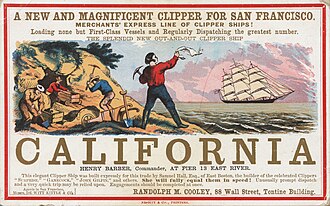Stefan Sweig is one of my favorite writers. He wrote many biographies (the one dedicated to Fouche is awesome) but also many novels, among which "The Eyes of My Brother, Forever" stands out. He had an eventful life, which he masterfully chronicled in his autobiography "The World of Yesterday" and committed suicide in Petropolis, desperate by the extension of Nazism.
In any case, this post is not dedicated to Sweig but to John Sutter, who appears in one of his most famous books "Decisive Moments in History."
Sutter's life is not far behind. He born in the German-Swiss border and emigrated to the United States at the age of 31. For making his long story shorter, he was among the first settlers of what is now California, where he arrived before it was an American territory.
The story Sweig tells in his book is a novel. It is true that Sutter made a lot of money through the exploitation of land he bought but not everything described in the book happened this way (for example, his wife did not die years before him but a few months later).
In 1848 gold was founded in his land. What was supposed to made him immensely rich led to his ruin. Thousands of people from all over the world invaded and razed his possessions without respecting any rule.
Anyway, if I bring this history to a legal blog it is because it gave rise to a lawsuit that is not very well known despite it was highly relevant. Indeed, Sutter claimed that all the gold was his because it was taken from his land, which he had acquired in 1841 by grant of Governor Alvarado.

The truth is that the legal situation was not clear (taken from Wikipedia)
When the Gold Rush began, California was a peculiarly lawless place. On the day when gold was discovered at Sutter's Mill, California was still technically part of Mexico, under American military occupation as the result of the Mexican–American War. With the signing of the treaty ending the war on 1848, California became a possession of the United States, but it was not a formal "territory" and did not become a state until September 1850. California existed in the unusual condition of a region under military control. There was no civil legislature, executive or judicial body for the entire region. Local residents operated under a confusing and changing mixture of Mexican rules, American principles, and personal dictates.
While the treaty ending the Mexican-American War obliged the United States to honor Mexican land grants, almost all the goldfields were outside those grants. Instead, the goldfields were primarily on "public land", meaning land formally owned by the United States government. However, there were no legal rules yet in place, and no practical enforcement mechanisms.
He died in 1880 virtually poor. The paradox is that in the days before his death, a bill to grant him a compensation of $50,000 was pending in the Congress but It adjourned before passing it. Sutter Street in downtown San Francisco is one of the few remaining legacies of John Sutter, who probably ended his days wishing that gold had never been found on his land.
un artículo muy interesante :):):)
ResponderEliminarPrueba
ResponderEliminar